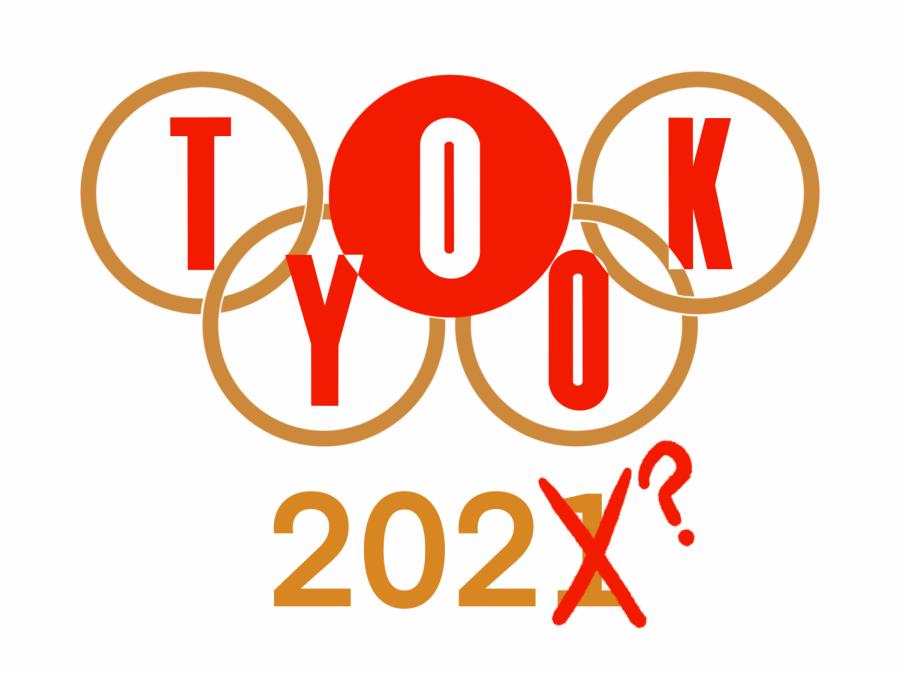It’s Time to Let Go of the Tokyo Olympics
February 26, 2021
The Olympics are an opportunity for countless nations around the world to come together and recognize the incredible talent and hard work of their athletes. Hosting cities have the honor of showcasing their arenas and insights into their culture to millions of viewers, and organizers in Olympic committees have the substantial responsibility of creating the best possible image of their represented nation. The Tokyo 2020 Organizing Committee has been working diligently since 2014 to prepare the best games possible, and were understandably reluctant to cancel the games outright. Despite the postponement of the Games to July 2021, the slogan “Tokyo 2020” remains, ensuring continuity in marketing.
A postponement of the Olympics rather than full cancellation is unprecedented and, frankly, entirely unnecessary. The last cancellation of the games, during World War II, stemmed from a global emergency in which it would be unsafe and insensitive to hold the games, as well as difficult for many countries to participate. A full cancellation made sense: it was almost certain that even after a short postponement, life would not be back to normal. Last year, however, countless unknowns prevented a clear decision, and for many countries, an Olympic games this summer is entirely within reason: a relatively low number of deaths in countries where the coronavirus has been systematically controlled clears the way for loosened precautions. However, a global event encouraging travel to Japan is irresponsible and unquestionably a super-spreader opportunity. As of now, there is no vaccine requirement for participating athletes and staff, and though this likely comes from a place of inclusivity, those involved should not be put in this position whatsoever.
Even with strict periods of quarantine, allowing the games to be held is a serious mistake. The recent Australian Open allowed limited spectators and participating athletes from across the world, and still resulted in at least ten positive cases in a country with just over 900 deaths. The Australian Open was also host to about ten percent of the number of expected athletes at the Tokyo Olympics, and administered rigorous testing in compliance with Australia’s pattern of extreme caution. Tokyo is currently experiencing a spike in coronavirus cases, and the next six months are growing to be more and more of an unknown.
Regardless, members of the organizing committee continue to be publicly optimistic about the games, alongside Japanese Prime Minister Yoshihide Suga, as public approval of Suga’s administration may be riding on the games’ success—or so he seems to believe. Suga stated that the Tokyo Games will be “proof that humanity has defeated the coronavirus,” and more importantly, proof that Japan has defeated it under his leadership.
Personal political gain, however, should not be a determining factor in a decision which could result in the loss of many lives. In prioritizing his demonstration of effective government, Suga blocks out the needs of the country, and even their specific desires (a poll taken by Japanese public broadcaster NHK showed 77% of the country against holding the games this summer as proposed). Also reflected in this data and a cause for concern for many in Japan is the country’s overwhelmingly older and often immuno-compromised population, with a larger vulnerability to the coronavirus and more concern for welcoming international visitors.
The consequences of the focus on pride and self-image which plagues Japanese leaders continue to affect their own citizens, and particularly Japanese women. An onslaught of volunteer resignations followed Organizing Committee President Yoshiro Mori’s sexist comments on February 3rd regarding planning meetings. Mori joked about female members of the committee taking up too much time, due to women’s excessive sense of competition and desire to prove themselves. These comments further reflect the atmosphere in the committee, which privileges only the voices of select male members.
It is crucial not to view the Olympic Committee as a mirror of Japanese society as a whole. Despite how it may seem from Mori’s egregious sexism, Japan has made sincere progress towards the inclusion of women in the power structures of the corporate and political world. The country is held back, however, by the authority that continues to be invested in men such as Mori, as well as the acceptance of behavior such as his. Mori resigned from the role on February 12th, ten days after his initial comments. No word from Prime Minister Suga was heard regarding his resignation.
Mori’s departure is a step forward, but it is important to recognize that he was president of the committee for six years prior. This final stretch will now only delve into more chaos, with a disgraced and incomplete committee. The Olympics, as an ideal, embody the highest and noblest achievements of human society. In the hands of this committee, however, the “2020” version not only runs the risk of tarnishing this ideal, but is putting lives at literal risk in the process. The Olympic athletes who have worked so hard to become beacons of athletic prowess will instead be placed in danger, and will serve as vehicles to endanger other communities involved in organizing the Games as well. Ironically, the gesture which would most reflect the traditional spirit of the Olympic Games would, in this global climate, be their cancellation.











